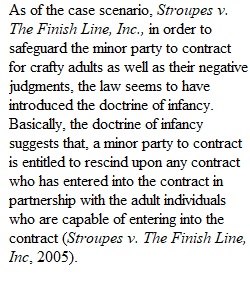


Q 11.6) Lindsey Stroupes was 16 years old and a sophomore in high school. Anthony Bradley, the manager of a Finish Line, Inc.’s store in a mall, offered Lindsey a position as a sales associate, which she accepted. Lindsey signed an employment contract that required that all claims against Finish Line be submitted to binding arbitration. Shortly after being hired, Lindsey quit and she and her parents filed a civil action in U.S. district court against Finish Line, Inc., alleging that Bradley sexually harassed Lindsey in violation of Title VII of the Civil Rights Act of 1964. Finish Line filed a motion to dismiss Lindsey’s lawsuit and to compel arbitration of her complaints. Lindsey argued that the arbitration agreement was voidable by her under the infancy doctrine because she was a minor when she signed the contract. Is Finish Line’s arbitration agreement voidable by Lindsey under the infancy doctrine? Stroupes v. The Finish Line, Inc., Web 2005 U.S. Dist. Lexis 6975 (United States District Court for the Eastern District of Tennessee, 2005)
View Related Questions